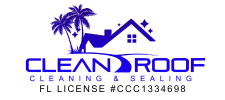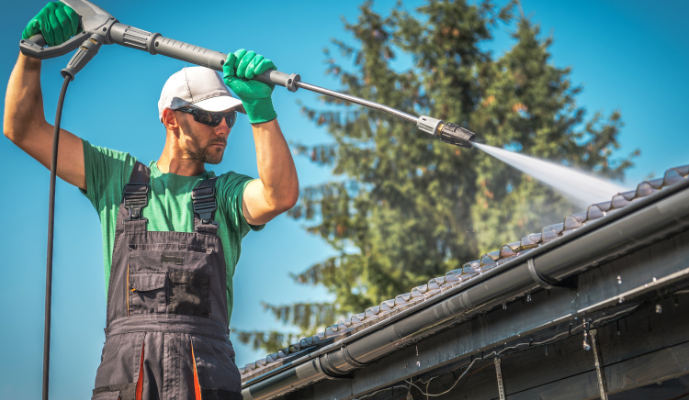Soft washing is a gentle yet effective method for cleaning roofs without using high-pressure techniques that may damage delicate tiles. This article explains the best solution for soft washing a roof, outlines the appropriate soft wash techniques, and provides guidance on preparations, application methods, and safe cleaning agents.
Understanding Gentle Roof Cleaning for Tile Preservation
Soft washing is defined as a low-pressure cleaning method that uses specialized cleaning solutions and softening agents to remove dirt, algae, moss, and organic buildup from roof tiles. By relying on chemical agents instead of forceful water jets, this method minimizes the risk of breaking or chipping tiles while restoring the roof’s appearance and extending its lifespan.
Defining Soft Wash Techniques for Delicate Roof Tiles
Soft wash techniques combine chemical penetration with low-pressure water to safely clean roof surfaces. The process involves applying a cleaning solution to loosen dirt and biologic growth, allowing it to dwell for a prescribed time, and then gently rinsing the area without high-pressure streams that could stress grout or tiles. Industry experts endorse these methods for cleaning surfaces such as clay, slate, and composite tiles.
Why Low-Pressure Washing Is the Best Solution for Soft Washing Tiles
Low-pressure washing minimizes physical abrasion and prevents damage to delicate roofing materials. Unlike traditional high-pressure methods that risk dislodging tiles or eroding protective coatings, low-pressure techniques allow the cleaning solution time to break down contaminants while a gentle rinse removes residues without harm. This approach keeps the roof clean without compromising long-term durability.
Benefits of Soft Washing for Extending Tile Roof Lifespan
Soft washing not only removes damaging algae, moss, and dirt but also prevents the buildup of substances that trap moisture. By reducing moisture retention, soft washing helps prevent cracks and deterioration. It also maintains the roof’s color and texture, keeping the home’s appearance fresh without the structural risks of high-pressure washing.
Contrasting Soft Washing With Abrasive Roof Cleaning Methods
The difference between soft washing and abrasive methods lies in the pressure applied. High-pressure power washing can strip protective layers, damage tiling, and force water under the roofing material, leading to leakage and degradation. In contrast, soft washing uses a controlled, low-pressure rinse with biodegradable chemicals, minimizing the risk of tile displacement and moisture intrusion.
Identifying Algae and Moss Growth That Necessitates a Soft Wash
Roofs showing signs of algae, moss, or lichen growth are ideal candidates for a soft wash. These contaminants can be unsightly and lead to deterioration over time by retaining moisture and promoting decay. Dark streaks, green patches, or fuzzy growth on tiles indicate that a soft wash is needed to prevent further damage and preserve the roof’s integrity.
Selecting an Optimal Soft Washing Solution for Different Tile Materials
Choosing the right soft washing solution is essential because different roof tile materials require specific chemical formulations. The optimal solution effectively removes contaminants while being gentle on the tile surface.
Assessing Your Specific Roof Tile Type for Safe Cleaning
The first step is determining the type of roof tile installed. Tiles may be clay, concrete, slate, or composite, and each responds differently to chemicals. For instance, delicate slate tiles require a milder solution than concrete or clay tiles. Homeowners should review manufacturer recommendations or consult a roofing specialist to select a suitable cleaning agent.
The Best Solution for Soft Washing Clay and Concrete Tiles
Clay and concrete tiles are durable but can be damaged by improper cleaning. The optimal solution for these materials typically uses a low-concentration sodium hypochlorite mixture combined with a mild detergent. This blend effectively removes organic-based stains and prevents algae growth while preserving tile integrity. A dilution rate of about 1:15 is generally recommended to avoid etching.
Considerations for Slate and Composite Tile Roof Soft Washing
Slate and composite tiles often need a gentler approach due to their natural variability and protective coatings. A soft washing solution with biodegradable surfactants and citric acid is recommended. Citric acid helps dissolve mineral deposits and organic residues without harming the slate structure. Composite tiles benefit from a blend of low-impact detergents and water that preserves their original finish.
How Water Quality Affects Soft Washing Outcomes on Tiles
Water quality is critical to the effectiveness of soft washing. Hard water, with high mineral content, may leave residues that reduce the cleaning agent’s performance. Softened or filtered water ensures a uniform application and thorough rinsing. In cases of compromised water quality, adding a water softener can enhance the cleaning outcome.
Key Preparations for a Damage-Free Tile Roof Soft Wash
Proper preparation minimizes risks and lays the groundwork for a successful soft washing operation.
Conducting a Thorough Pre-Wash Roof Inspection
Before soft washing, inspect the roof to identify loose, cracked, or broken tiles and any underlying structural issues that might be aggravated by cleaning. This inspection helps determine if repairs are needed first and documents any existing damage for insurance purposes.
Safeguarding Landscaping and Surrounding Property From Runoff
Soft washing generates runoff that can affect nearby landscaping, driveways, and structures. Homeowners should shield vulnerable areas using tarpaulins, plastic sheeting, or temporary barriers. This planning protects property and ensures compliance with local environmental regulations.
Essential Safety Gear for Performing a Roof Soft Wash
Safety gear is crucial. Workers and homeowners should use non-slip footwear, safety harnesses, gloves, and eye protection. In areas with poor ventilation, masks or respirators may be necessary when handling chemicals. Using certified safety equipment minimizes the risk of injury and exposure.
Clearing Debris From Gutters to Aid the Soft Washing Process
Cleaning gutters before soft washing is essential. Clogged gutters can impede water flow and lead to uneven application of cleaning agents. Clearing debris ensures uniform distribution of the solution and prevents water damage to fascia and soffits.
Implementing the Best Solution for Soft Washing Your Tile Roof Effectively
A systematic approach to applying and rinsing the cleaning solution is key to protecting roof tiles and achieving a thorough cleaning process.
Proper Application of Cleaning Solutions to Roof Tiles
The cleaning solution should be applied using low-pressure spray equipment to evenly cover the roof without displacing tiles. Work in sections with slight overlap to ensure no areas are missed. Using a calibrated pump spray system helps the solution adhere uniformly and penetrate biofilm on the tiles.
Appropriate Dwell Times for Cleaning Agents on Tiles
Allow the cleaning solution to sit long enough to break down dirt and biological contaminants—typically 10 to 20 minutes, depending on the stain severity and cleaning agent used. Adhering to manufacturer recommendations for dwell time ensures effective cleaning without chemical residue buildup.
Gentle Rinsing Techniques to Prevent Tile Damage
After the cleaning solution has worked, it should be gently rinsed off using low-pressure water. A garden hose with an adjustable nozzle set to a gentle stream is ideal, as it removes residues gradually without etching or damaging the tiles.
Post-Cleaning Inspection for Ensuring Tile Integrity
Once rinsing is complete, conduct a post-cleaning inspection to ensure all areas have been cleaned and no damage has occurred. Look for residual stains, minor tile displacement, or chemical residue. Document any issues and plan a follow-up soft wash for areas that need additional treatment.
Choosing Appropriate Cleaning Agents for a Safe Tile Roof Soft Wash
Selecting the proper cleaning agents is crucial for an effective yet gentle soft wash on roof tiles.
Evaluating Biodegradable and Eco-Friendly Soft Wash Products
Biodegradable and eco-friendly soft wash products are popular because they have minimal environmental impact. These products use plant-based surfactants and naturally derived agents that break down organic matter without harmful residues. They also reduce the risk of corrosion or staining on roof tiles, making them a durable choice.
Understanding Sodium Hypochlorite Mixtures for Roof Tile Cleaning
Sodium hypochlorite is commonly used for its disinfectant properties and ability to remove algae and stains. In soft washing, it must be diluted appropriately—typically 3% to 5% in water—to clean effectively without harming the tile surface. Following proper dilution instructions is key to balancing cleaning efficiency with tile preservation.
The Importance of Correct Dilution Ratios for Tile Safety
Using the correct dilution ratio is critical because an overly concentrated solution can strip protective coatings or cause discoloration. Industry guidelines often recommend a ratio around 1:15 or 1:20 (chemical to water). This balance ensures the agent is effective at removing buildup while remaining gentle on the tiles, thus extending the roof’s lifespan.
Chemicals to Avoid When Soft Washing Roof Tiles
Certain chemicals, such as abrasive cleaners, concentrated acids, or alkaline solutions, should be avoided as they can etch, corrode, or discolor tiles. Solvents that are too aggressive may also strip protective sealants. Homeowners should choose products specifically formulated for roofing applications to ensure both effective cleaning and tile safety.
When to Engage Professionals for Your Tile Roof Soft Washing Needs
While DIY soft washing can work, there are times when professional help is advisable to avoid inadvertent damage and ensure a high-quality cleaning process.
Recognizing Limitations and Risks in DIY Tile Roof Cleaning
DIY soft washing carries risks if the proper equipment, chemical measurements, or safety procedures are not followed. These risks include tile breakage, chemical overuse, and injury from falls or chemical exposure. Recognizing these challenges can help homeowners decide when to hire a professional.
Advantages of Hiring Certified Roof Cleaning Specialists
Certified roof cleaning specialists offer expertise, access to commercial-grade equipment, and strict adherence to safety protocols. Their experience with various tile types ensures a uniform cleaning application and quick resolution of potential issues. Professional services often include insurance and warranties, offering additional peace of mind.
Finding a Reputable Service Offering the Best Solution for Soft Washing
A reputable service can be found through research, customer testimonials, and industry certifications. Homeowners are advised to seek recommendations from trusted sources or local roofing associations. A reliable contractor will offer detailed consultations, customized cleaning plans, and transparent pricing while using eco-friendly, tile-safe cleaning agents.
What to Expect From a Professional Tile Roof Soft Washing Service
Professional soft washing services typically begin with a comprehensive roof inspection to identify areas that require special attention. The contractor will then customize a cleaning solution, set appropriate dwell times, and schedule the cleaning to minimize disruption. Certified technicians use specialized low-pressure equipment to gently rinse the roof, followed by a thorough post-wash inspection and maintenance recommendations.
Table: Comparison of Soft Washing Solutions for Different Roof Tile Types
Before starting a soft wash project, homeowners can benefit from comparing key attributes of different cleaning solutions and their optimal applications.
| Roof Tile Type | Recommended Cleaning Agent | Key Dilution Ratio | Primary Benefit | Considerations |
|---|---|---|---|---|
| Clay & Concrete | Sodium hypochlorite with mild detergent | 1:15 to 1:20 | Effective algae removal | Ensure even application to avoid etching |
| Slate | Biodegradable surfactant with citric acid | 1:20 to 1:25 | Gentle on delicate surfaces | Maintain low dwell time to prevent staining |
| Composite Tiles | Eco-friendly detergent-based solution | 1:15 | Preserves protective resin finish | Avoid harsh chemicals that strip sealants |
| All Types (General) | Biodegradable, eco-friendly soft wash formula | Manufacturer recommended | Broad-spectrum cleaning | Confirm water quality and proper rinsing |
This table provides a side-by-side comparison of appropriate cleaning solutions for various roof tile materials, highlighting the importance of correct dilution ratios and the specific benefits each solution offers.
Final Thoughts
Soft washing is a highly effective and safe method for cleaning roof tiles without causing damage. By selecting appropriate cleaning solutions, following thorough preparatory and application guidelines, and engaging professional help when needed, homeowners can preserve the beauty and integrity of their tile roofs for years. Florida Clean Roof offers professional, eco-friendly roof cleaning services across Florida, using soft wash techniques to safely remove algae, moss, and stains from all roof types. The use of low-pressure techniques combined with eco-friendly agents ensures thorough cleaning while preventing structural weakening, making soft washing a wise investment in long-term property maintenance.

